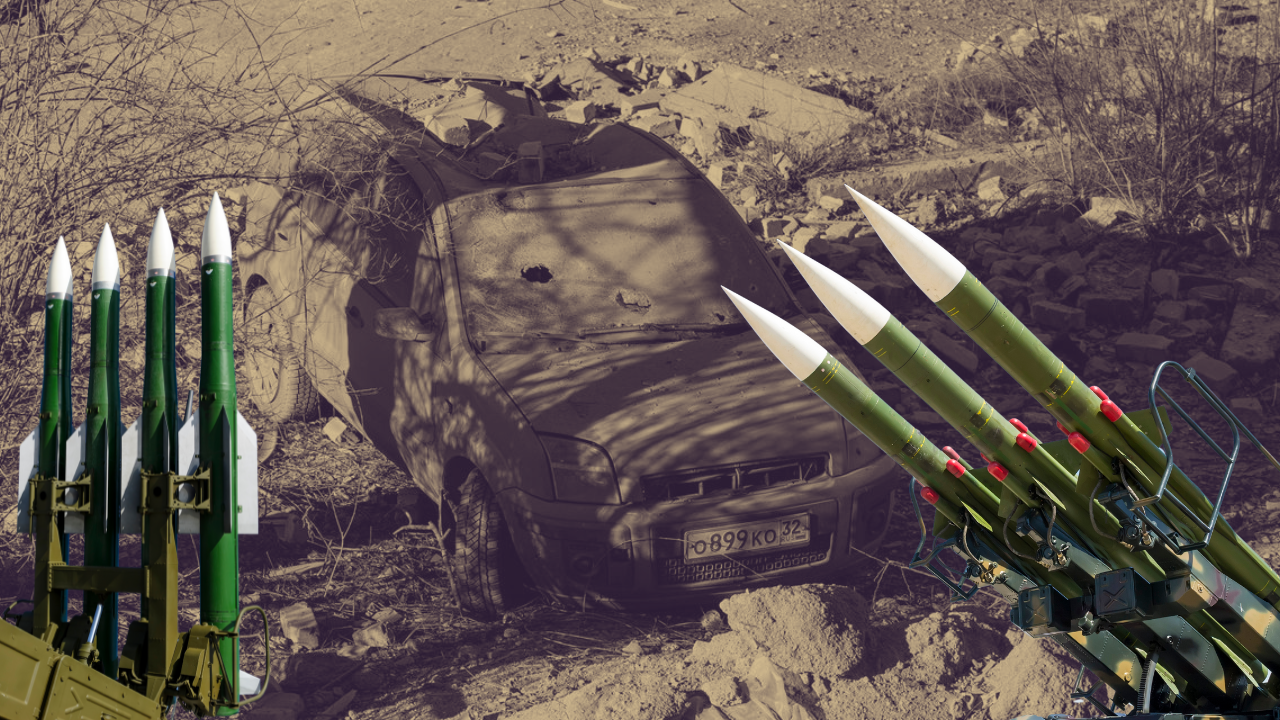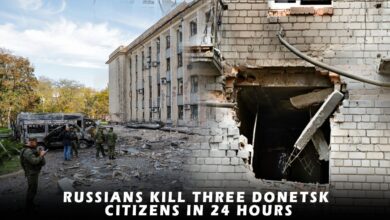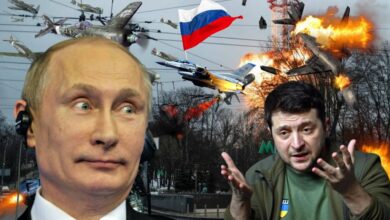Ukrainian energy grid was not destroyed by Russian bombs. Corruption has the potential to break itself.

During his recent Far Eastern tour, Vladimir Putin arrived in Khabarovsk, where he was greeted with great affection by a handful of young, patriotic Russians brandishing signs.
Putting on a hat, please, one of them said. It’s cold here, Vladimir Vladimirovich, someone else told the president. “We require your good health,” a third person stated.
Even though tens of thousands of their countrymen were experiencing freezing conditions in their own homes at that precise moment, there was not a trace of irony in their message.
News outlets are reporting that about two dozen regions have experienced heating outages as Russia’s winter has arrived with subzero temperatures, as it does each year. Although Putin is attempting to destroy Ukraine’s infrastructure through missile strikes, the domestic disruptions provide a clear picture of the shortcomings, corruption, and labor scarcity of his government.
It is not ideal for Putin that shivering Russians are piercing his vision of a mighty Russia, not only in distant provinces but also dozens of kilometers away from the Kremlin, ahead of the acclamation of his 24-year rule he expects in elections in March.
The nationwide heating collapse, according to experts, has several causes, none of which are good news for the average person.
The origins of the problem can be found in the Soviet era. The energy industry was centralized back then, concentrating on “generating cheap heat and electricity for industry, not the needs of ordinary citizens,” as former deputy energy minister Vladimir Milov, who is now an opposition politician, explained to POLITICO.
Even now, a vast network of pipes connects residential areas to the massive boiler plants that still power Russia’s heating system. These plants are frequently found on the outskirts of cities.
Milov remembered going to a neighborhood in Khabarovsk where the hot water was supplied by a boiler plant located about 15 kilometers away.
“The water was already cold when it got to them,” he said.
The centralized system is not only ineffective, but it also has the drawback of being extremely problematic when something goes wrong.
About half of Novosibirsk’s over 1.5 million residents are without hot water because of a single fractured pipeline, according to Sergei Boiko, a former deputy for the city council.
Boiko told POLITICO, “That is life-threatening in these temperatures.” She also mentioned that hundreds of apartment buildings, hospitals, and schools were impacted.
The problem is not just that there is no central heating. In certain locations, homes and streets have been inundated with flaming hot water geysers caused by ruptured pipelines, resulting in injuries to onlookers. Others have experienced water and power outages.
To finish the dystopian scene, a sewage plant break in Novocherkassk caused an area to be completely inundated with excrement.
Burying the proof
However, the same centralized system has been passed down to other former Soviet nations, albeit without the implosion tendency.
Analysts claim that corruption is the solution to that puzzle.
According to Milov, the former deputy energy minister, state funding for the maintenance and replacement of aging pipelines has totaled several dozen billion dollars in rubles since the 1990s.
But much of it never reached its destination, just like the hot water in the Khabarovsk neighborhood.
Corrupt officials have long favored the utility sector as a source of enormous amounts of government funding, with little to no public oversight.
Russians’ access to hot water is reportedly temporarily cut off for a few days each summer to accommodate maintenance. However, the fixes are frequently impromptu or limited to paper.
There are numerous stories of workers demolishing roads, painting over rust in pipes with fresh paint, or moving defective parts around in the guise of work only to bury the evidence underground.
Russia’s Potemkin-style utility grid is falling apart at the seams every year when temperatures plummet, the product of decades of such machinations.
However, a confluence of elements, both directly and indirectly related to the conflict in Ukraine, has made the situation especially dire this year.
One is that there is a severe labor shortage in practice despite what Putin likes to boastfully refer to as record-low unemployment rates.
To avoid being called up for duty, hundreds of thousands of Russian men have either left the nation or been sent to fight on the front lines. Additionally, a declining ruble has lessened migrant workers’ attraction to Russia.
86 percent of the 1,000 businesses and organizations surveyed in a recent survey by Superjob, a well-known Russian job website, stated they were having trouble filling openings.
There may be a lot more issues than there are engineers, plumbers, and electricians to handle them.
Secondly, in the name of wartime societal consolidation, there was an almost complete suppression of civil society, which resulted in even less public oversight than before the conflict.
Local informants, such as Novosibirsk’s Boiko, an ally of the imprisoned politician Alexei Navalny, have been driven into exile, in his case to Mexico to evade an international warrant for his arrest issued by Russia. Some have disappeared or been imprisoned.
Lastly, according to Boiko, regional governors have used rainy day funds to plug military gaps by providing soldiers with equipment or treating injured soldiers who return from the front. This was done in an attempt to address the issues that the Kremlin had thrown into their laps.
“Bulletproof vests were already purchased with the money that is now required for repairs.”

The imposition of Western sanctions on technology could exacerbate the already dire circumstances in the coming years as the system collapses and more infrastructure—much of which dates back to the 1970s—reaches the end of its useful life.
As Moscow intensifies its war machine, planned federal spending on the utility sector is expected to be cut in half by 2026.
“The amount of money being spent on the war in just one month could completely revamp the utility industry within a few years,” stated Boiko.
Spring arrives after winter
Since protesters face significant risks and Russia’s geographic location acts as a natural barrier, local complaints typically stay inside their own borders.
This time, however, Russians who reside just a few dozen kilometers from the Kremlin have climbed into the same leaky boat as their counterparts in Makhachkala in the south, Vladivostok in the far east, and Petrozavodsk in the north.
Their message is nearly the same as the pictures and videos they post online, showing people attempting in vain to stay warm with ice covering their windows.
In one video, a woman queries how people can survive in such temperatures. “We just exist; we don’t live.“
Some people are now openly questioning whether the utility collapse could be a black swan event leading up to election season, shattering Putin’s Pleasantville façade in a way that the war in Ukraine hasn’t been able to do thus far.
Aware of the delicate nature of the situation, the authorities have started to designate scapegoats and the fallout has begun to occur.
The regional investigative committee announced that it had detained the heads of the local boiler plant and an ammunition factory for providing unsafe services, as well as the deputy head of the city administration on suspicion of abusing power for giving the plant a safety certificate despite knowing of “defects.” This came shortly after Putin ordered Russia’s Emergency Situations Ministry to “take all necessary measures” to resolve the heating crisis in Podolsk, a city located about 40 kilometers south of Moscow.

The privately held nature of Podolsk’s boiler plant makes it an exception to the norm and a safe way for the Kremlin to demonstrate its control while simultaneously averting any potential criticism.
Russian propagandists have demonstrated their selective focus by either completely ignoring the crisis or, focusing on the Podolsk situation, railing against the negative aspects of privatization.
It might be too soon to declare the revolution, even though that is unlikely to allay the visceral rage and frustration. Anger over utility and housing problems had previously thawed with the ice.
According to Milov, “people have short memories.” “Spring follows winter.”
At least it appears that the Kremlin is counting on that.
Dmitry Peskov, Putin’s spokesperson, told reporters that although “herculean efforts” had been made over a decade and a half to upgrade the grid, 10 to 15 years of repairs had proven insufficient, and the program was “stretched over time.”
Lyudmila, 76, a pensioner in Novosibirsk, was overjoyed to have her heating turned back on after being without it for a few days. She chose not to reveal her last name out of concern for her safety.
“We are not freezing anymore,” she stated to POLITICO. “That is a development.”
She did, however, voice her cautious skepticism that more time would suffice to prevent another collapse. “We never had these issues in the Soviet era,” she remarked, “but I’m not sure why.”








